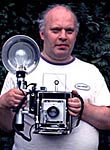|
|
 
|
|
Author
|
Topic: Other Countries Other Formats?
|
|
|
|
|
|
|
|
|
|
|
|
|
|
|
Michael Schaffer
"Where is the
Boardwalk Hotel?"

Posts: 4143
From: Boston, MA
Registered: Apr 2002
|
 posted 12-11-2002 11:35 AM
posted 12-11-2002 11:35 AM





quote:
The Germans apparently still have 16mm mag striping capability, though the format is all but dead in the US.
That may be true, since there are a few very good printing labs in Berlin and Munich which might have the capability. However, 16mm is hardly ever used anymore and has been practically replaced by digital formats for TV and documentary production.
In the cinema, there are exactly the same formats as everywhere. At the beginning of the 90s, Kinoton proposed a digital format for the cinema but I have no idea what it was. I would have to find out. AFAIK, CDS was never commercially introduced here but I know some people who say it has been demonstrated to exhibitors in Munich once.
As everywhere, Dolby Digital is by far the most commonly used digital format. Many of the newer multiplexes also have dts and some of the bigger screens also have SDDS. It is not uncommon for big screens to have two or even three digital formats. In the field of analogue processors, the original Dolby units are installed almost everywhere. Manufacturers like Smart or Panastereo are extremely rarely to be found.
In the olden days, there was a mono format which is commonly called "Klangfilm" after the manufacturer which was superior to Academy mono in that the HF were not as steeply filtered off.
The other difference to overseas is that most cinemas have Kinoton or Ernemann projectors. American projectors like Christie are very rare. A lot of "older" cinemas still have the Philips or Bauer projectors which are very sturdy.
| IP: Logged
|
|
Michael Schaffer
"Where is the
Boardwalk Hotel?"

Posts: 4143
From: Boston, MA
Registered: Apr 2002
|
 posted 12-11-2002 11:36 AM
posted 12-11-2002 11:36 AM





quote:
The Germans apparently still have 16mm mag striping capability, though the format is all but dead in the US.
That may be true, since there are a few very good printing labs in Berlin and Munich which might have the capability. However, 16mm is hardly ever used anymore and has been practically replaced by digital formats for TV and documentary production.
In the cinema, there are exactly the same formats as everywhere. At the beginning of the 90s, Kinoton proposed a digital format for the cinema but I have no idea what it was. I would have to find out. AFAIK, CDS was never commercially introduced here but I know some people who say it has been demonstrated to exhibitors in Munich once.
As everywhere, Dolby Digital is by far the most commonly used digital format. Many of the newer multiplexes also have dts and some of the bigger screens also have SDDS. It is not uncommon for big screens to have two or even three digital formats. In the field of analogue processors, the original Dolby units are installed almost everywhere. Manufacturers like Smart or Panastereo are extremely rarely to be found.
In the olden days, there was a mono format which is commonly called "Klangfilm" after the manufacturer which was superior to Academy mono in that the HF were not as steeply filtered off.
The other difference to overseas is that most cinemas have Kinoton or Ernemann projectors. American projectors like Christie are very rare. A lot of "older" cinemas still have the Philips or Bauer projectors which are very sturdy.
| IP: Logged
|
|
|
|
|
|
|
|
|
|
|
|
All times are Central (GMT -6:00)
|
|
Powered by Infopop Corporation
UBB.classicTM
6.3.1.2
The Film-Tech Forums are designed for various members related to the cinema industry to express their opinions, viewpoints and testimonials on various products, services and events based upon speculation, personal knowledge and factual information through use, therefore all views represented here allow no liability upon the publishers of this web site and the owners of said views assume no liability for any ill will resulting from these postings. The posts made here are for educational as well as entertainment purposes and as such anyone viewing this portion of the website must accept these views as statements of the author of that opinion
and agrees to release the authors from any and all liability.
|

 Home
Home
 Products
Products
 Store
Store
 Forum
Forum
 Warehouse
Warehouse
 Contact Us
Contact Us




 Printer-friendly view of this topic
Printer-friendly view of this topic












![[Big Grin]](biggrin.gif)
![[Wink]](wink.gif)




